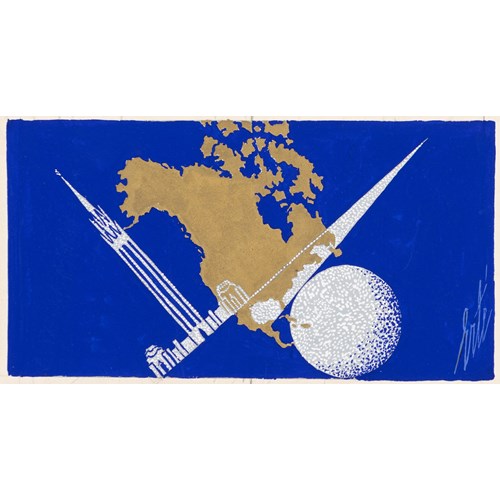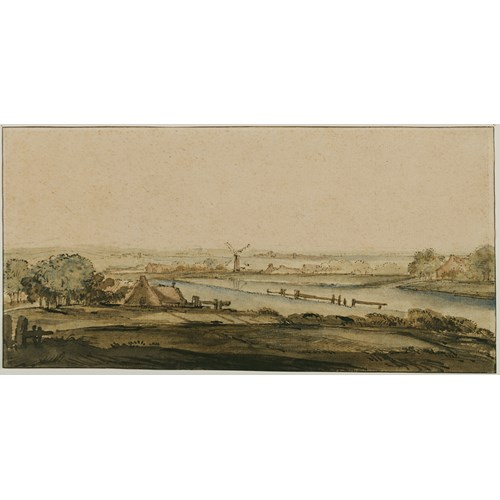Marketplace
The Assumption of the Virgin
Gaspare DIZIANI
The Assumption of the Virgin
Medium Pen and black ink and grey wash
Dimension 43 x 25.1 cm (16⁷/₈ x 9⁷/₈ inches)
As one modern scholar has commented, ‘in a manner which is not unique in the Venetian Settecento, [Gaspare Diziani] emerges as a more interesting and gifted artist in his drawings than in his paintings.’ Diziani was a productive draughtsman, and the largest surviving group of drawings by the artist, numbering almost two hundred sheets, is today in the Museo Correr in Venice; most of these come from an album assembled by the late 18th century Venetian collector Ascanio Molin. Other significant holdings of drawings by Diziani are in the Louvre in Paris, the Hermitage in St. Petersburg and the Albertina in Vienna, while another fine and varied group is in the Städel Museum in Frankfurt.
The scholar Filippo Pedrocco has noted of Diziani that ‘His large body of graphic work is of particularly high quality, including numerous preparatory drawings for his paintings that give some idea of his mastery of a variety of techniques. His drawing is spontaneous and excitable, with lines sometimes worked over several times.’ While Diziani’s drawings often display the particular influence of the draughtsmanship of his master Sebastiano Ricci, they also show stylistic similarities with the pen manner of his slightly younger Venetian contemporary, Giovanni Antonio Pellegrini, and the drawings of all three artists have often been confused. Andrew Robison has further pointed out that ‘Like several other Venetian artists of the eighteenth century, Diziani frequently used red chalk for his initial sketch. That, combined with gray or brown pen and ink and wash created richly coloristic works.’
Unlike the majority of the artist’s extant drawings, the present sheet is quite highly finished and elaborate in composition. As such, it may have been intended as much as an autonomous work of art as a study for a proposed altarpiece. Although some of the figures are in reverse, the composition of this drawing is akin to that of Diziani’s oil sketch modello for an altarpiece of The Assumption of the Virgin of c.1734-1740, today in the Los Angeles County Museum of Art, as well as to another, smaller bozzetto of the same subject and approximate date, formerly in a private collection in Belluno. A double-sided drawing in the Museo Correr in Venice can be related to the Belluno bozzetto, and incorporates a similar ascending Virgin to that seen in this drawing. Diziani produced a number of other drawings of the Assumption of the Virgin, although most are considerably freer in handling than the present sheet. The Virgin appears in a similar pose in one such study, a drawing sold at auction in 1981, and also in a drawing of the Immaculate Conception in the Louvre.
While the male nude drawn in red chalk on the verso of the present sheet cannot be definitively related to any surviving painting by Diziani, its pose is close, albeit in reverse, to that of a figure in the foreground of a large ceiling fresco by the artist in the Palazzo Belloni in Venice, painted in the 1750s, as well as one of his illustrations for an edition of Dante’s Divine Comedy, published by Antonio Zatta in Venice in 1757.
Born in East Prussia, Werner Gramberg (1896-1985), was an art historian and collector. He completed a doctorate on the sculptor Giambologna in 1928, and worked at the State Museums in Berlin. In 1934, however, he was forced to leave his post in Berlin because his wife was part Jewish. Gramberg settled in Hamburg in 1945, and four years later was named curator of the numismatic collections of the Kunsthalle in Hamburg, later serving as head of the sculpture collections and Deputy Director. In 1957 he took up a post as professor of art history at Hamburg University. An expert in Italian Renaissance art, he was a co-founder of the Stiftung zur Förderung der Hamburgischen Sammlungen, working actively within the foundation until his death in 1985. Gramberg’s collection included an important group of sculptures, paintings and drawings, many of which were bequeathed to the Hamburger Kunsthalle. One of the last drawings he acquired, this Assumption of the Virgin by Diziani has remained in his family’s collection until recently.
Pen and black ink and grey wash, over an underdrawing in red chalk.
A half-length study of a male nude leaning forward, drawn in red chalk, on the verso.
Inscribed Cesari d’Arpino / Mariae Himmelfahrt Feder u… / [?] 1890 on the verso.
The scholar Filippo Pedrocco has noted of Diziani that ‘His large body of graphic work is of particularly high quality, including numerous preparatory drawings for his paintings that give some idea of his mastery of a variety of techniques. His drawing is spontaneous and excitable, with lines sometimes worked over several times.’ While Diziani’s drawings often display the particular influence of the draughtsmanship of his master Sebastiano Ricci, they also show stylistic similarities with the pen manner of his slightly younger Venetian contemporary, Giovanni Antonio Pellegrini, and the drawings of all three artists have often been confused. Andrew Robison has further pointed out that ‘Like several other Venetian artists of the eighteenth century, Diziani frequently used red chalk for his initial sketch. That, combined with gray or brown pen and ink and wash created richly coloristic works.’
Unlike the majority of the artist’s extant drawings, the present sheet is quite highly finished and elaborate in composition. As such, it may have been intended as much as an autonomous work of art as a study for a proposed altarpiece. Although some of the figures are in reverse, the composition of this drawing is akin to that of Diziani’s oil sketch modello for an altarpiece of The Assumption of the Virgin of c.1734-1740, today in the Los Angeles County Museum of Art, as well as to another, smaller bozzetto of the same subject and approximate date, formerly in a private collection in Belluno. A double-sided drawing in the Museo Correr in Venice can be related to the Belluno bozzetto, and incorporates a similar ascending Virgin to that seen in this drawing. Diziani produced a number of other drawings of the Assumption of the Virgin, although most are considerably freer in handling than the present sheet. The Virgin appears in a similar pose in one such study, a drawing sold at auction in 1981, and also in a drawing of the Immaculate Conception in the Louvre.
While the male nude drawn in red chalk on the verso of the present sheet cannot be definitively related to any surviving painting by Diziani, its pose is close, albeit in reverse, to that of a figure in the foreground of a large ceiling fresco by the artist in the Palazzo Belloni in Venice, painted in the 1750s, as well as one of his illustrations for an edition of Dante’s Divine Comedy, published by Antonio Zatta in Venice in 1757.
Born in East Prussia, Werner Gramberg (1896-1985), was an art historian and collector. He completed a doctorate on the sculptor Giambologna in 1928, and worked at the State Museums in Berlin. In 1934, however, he was forced to leave his post in Berlin because his wife was part Jewish. Gramberg settled in Hamburg in 1945, and four years later was named curator of the numismatic collections of the Kunsthalle in Hamburg, later serving as head of the sculpture collections and Deputy Director. In 1957 he took up a post as professor of art history at Hamburg University. An expert in Italian Renaissance art, he was a co-founder of the Stiftung zur Förderung der Hamburgischen Sammlungen, working actively within the foundation until his death in 1985. Gramberg’s collection included an important group of sculptures, paintings and drawings, many of which were bequeathed to the Hamburger Kunsthalle. One of the last drawings he acquired, this Assumption of the Virgin by Diziani has remained in his family’s collection until recently.
Pen and black ink and grey wash, over an underdrawing in red chalk.
A half-length study of a male nude leaning forward, drawn in red chalk, on the verso.
Inscribed Cesari d’Arpino / Mariae Himmelfahrt Feder u… / [?] 1890 on the verso.
Medium: Pen and black ink and grey wash
Dimension: 43 x 25.1 cm (16⁷/₈ x 9⁷/₈ inches)
Provenance: Christian Humann, New York, until c.1981
Galerie Arnoldi-Livie, Munich, in 1982
Acquired from them in 1982 by Werner Gramberg, Hamburg
Thence by family descent until 2020.
Literature: Munich, Galerie Arnoldi-Livie, Vom Manierismus bis in die Goethezeit: Bilder und Zeichnungen, 1982, no.23.
More artworks from the Gallery









